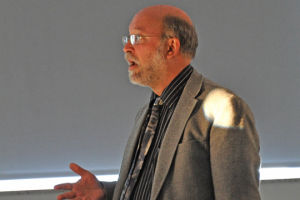Longtime faculty has sense of recent Washburn history
September 8, 2010
As school gets back on track, familiar faces fill the halls of Washburn. Among those many faces is Thomas Prasch, professor of history and department chair.
Prasch began his teaching career part-time at Indiana University before coming to Washburn University in 1997. At the time being a history professor entailed a tough job market. Washburn was the first school to offer Prasch a full-time job.
Since then the school has been through many changes in the past 10 years with things like the building of the Living Learning Center in 2001. Prasch has noticed a few changes himself.
“I think the biggest single change has been that shift in terms of the basic student body; a new emphasis on younger, direct from high school students,” said Prasch.
In addition to a different looking student body, the average age of students on campus in 1997 was nearly 26 or 27 years of age, according to Prasch.
“There were a lot more non-traditional students,” said Prasch.
Prasch also noted that a majority students were only part-time, which meant less campus activities available. But, coming here the same year as Jerry Farley, Washburn University President, Prasch had no idea about the administration prior to the current one.
The school has allowed Prasch room to grow with his teachings, including that of Victorian Britain and Europe. One of the perks of being a long-time faculty member is the opportunity to indulge on what Prasch noted as the, “Sweet Sabbatical,” developed by sisters with the last name of Sweet. Convinced that Washburn faculty did not get out enough, a fund was set up for faculty of more than three or more years to take a 60-day trip for research and educational purposes.
Prasch has made a total of three trips so far.
“It’s a good secret! I’ve done a lot of research as a result of that,” said Prasch.
Based on his previous ten years of knowledge, Prasch couldn’t much say exactly what might be in store for Washburn’s future.
“One of the great advantages of being a historian is that I deal with the past, and I don’t have to predict the future,” said Prasch. “So I’m going to resist a real firm answer, but I will say, broadly speaking, a couple things are real clear. One is that Washburn has a really refreshing collegiality among the faculty. I think that kind of opportunity will continue to exist.”



